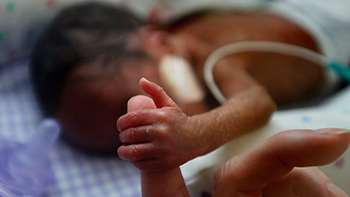‘Don’t use COVID-19 as excuse to stop attending child welfare clinics’

Following the outbreak of COVID-19 and the rising number of cases in the country, health experts say there has been a decline in the number of nursing mothers who are supposed to attend child welfare clinics.
According to practitioners, some mothers say they fear exposing themselves and their babies to the virus, hence the slow patronage in routine services.
However, the Head of the Neonatal Intensive Care Unit (NICU) at the Accra Regional Hospital, Dr Nana Okai Brako, believes mothers should not put up such excuses for themselves.
The paediatrician, speaking to The Spectator, said that different forms of post natal care remained an essential part of a child’s wellbeing, therefore, mothers should not use coronavirus as a cover up against attending child welfare clinics.
He maintained that mothers could still observe the necessary health protocols and take good care of their children in the wake of the pandemic.
Touching on jaundice as one of the common diseases in babies, he said that the disease still accounted for a chunk of out-patient admissions at the pediatrics department.
The month of May each year is set aside to create awareness on jaundice in newborn babies.
Though statistics were not readily available, Dr Brako noted that the effect of neonatal jaundice in babies could still be dire if not detected and treated early.
He explained Neonatal jaundice as the “yellowing of the eyes or the skin of a baby which is caused by increase in a substance known as “bilirubin” in the baby’s bloodstream.”
He noted that the condition occurred within the first 28 days after a baby is born, adding that, the disease had varied effects on babies, including visual and hearing impairments as well as brain disorders.
“The first two weeks is very critical when it comes to detection and treatment of neonatal jaundice and it is one of the conditions mothers must look out for,” he said.
Differences in blood group between the mother and baby, infections and the use of camphor by some mothers, he noted, were among the causes of jaundice in babies.
Dr Brako, also the Focal Person of New Born Care in the Greater Accra Region, therefore advised mothers to always bring their babies out to properly lit areas for early signs of neonatal jaundice.
He further urged mothers to ensure their children were vaccinated against preventable diseases at the hospitals and child welfare clinics.
“Mothers should try to keep their babies warm at all times and also abide by the exclusive six months breastfeeding guideline as recommended.
“Babies should only be separated from their mothers only when mothers, due to a peculiar condition, are too weak to handle them,” he stressed.
Mothers, he said, should expect that they would be admitted at the hospital when they came to hospital with signs of jaundice in their babies.
Dr Brako insisted that nursing mothers should follow appropriate safety precautions and continue to breastfeed their babies as efforts were being made to combat the pandemic.
By Ernest Nutsugah














